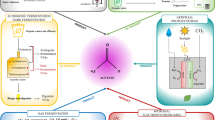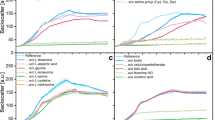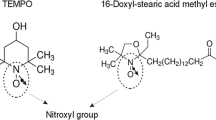Rhodobacter sphaeroides
2.4.1 exposed to selenate or selenite produced volatile selenium compounds. Total amounts of dimethyl selenide, dimethyl diselenide, dimethyl sulfide and dimethyl disulfide in culture medium and headspace were determined. The highest selenate volatilization occurred in the late stationary phase of growth. However, cultures deprived of light in the stationary phase of growth produced much less of the volatile organo-selenium compounds. Lower culture pHs increased the rate of selenium volatilization. Low sulfate concentration limited biomass production and selenium volatilization; high sulfate concentrations had an enhancing effect on the release of organo-selenium compounds. Cultures of R. sphaeroides reacted very differently to amendments with increasing amounts of selenate and selenite. Only small amounts of selenite were volatilized; meanwhile high amounts of methylated selenides were found in selenate-poisoned cultures.
Similar content being viewed by others

Author information
Authors and Affiliations
Additional information
Received 03 February 1997/ Accepted in revised form 16 May 1997
Rights and permissions
About this article
Cite this article
Van Fleet-Stalder, V., Gürleyük, H., Bachofen, R. et al. Effects of growth conditions on production of methyl selenides in cultures of Rhodobacter sphaeroides . J Ind Microbiol Biotech 19, 98–103 (1997). https://doi.org/10.1038/sj.jim.2900423
Issue Date:
DOI: https://doi.org/10.1038/sj.jim.2900423



